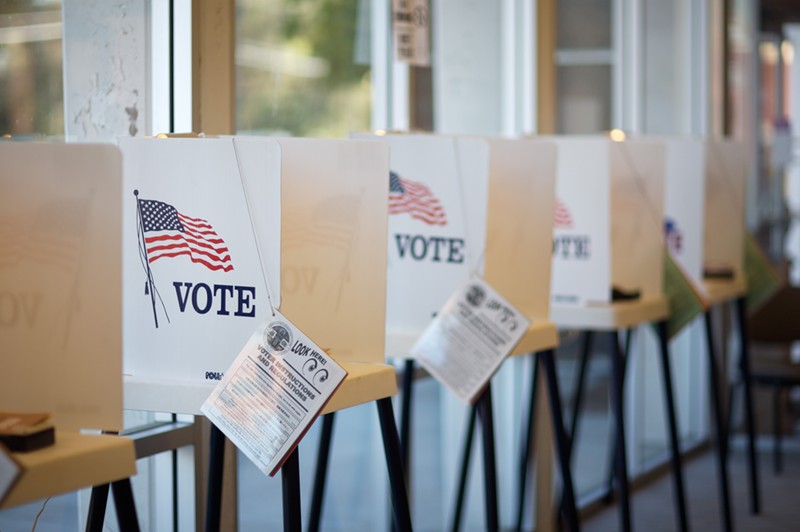Campaigns had until Monday, August 5, to submit the required 124,238 signatures to the Colorado Secretary of State's Office. In the week leading up to the deadline, eight proposals failed to turn in their signed petitions, while three proposals met that threshold. Now those signatures must be verified by the end of the month before the initiatives officially secure their spot on the ballot.
Those three measures join three others that finished petitioning last month and are still awaiting signature confirmation. The proposals include decreasing the state property tax assessment rate, requiring that certain repeat offenders convicted of violent crimes serve their full sentence, and adding a child's right to school choice to the state constitution.
Three other citizen-initiated measures have already made the ballot: an effort to enshrine the right to abortion in the state constitution, cap property tax revenue increases at 4 percent each year, and prohibit trophy hunting of big cats.
Five more initiatives were sent to the ballot by state lawmakers, proposals to: let the state keep all sports betting tax revenue to fund water projects; create an excise tax for gun and ammo purchases to fund victim services; remove the ban on same-sex marriage from Colorado's constitution; adjust certain election filing deadlines; and let judges deny bail to people charged with first-degree murder.
If the signatures are certified for the six citizen-initiated measures that are currently being verified, Colorado voters will see fourteen initiatives on their November ballot — in addition to local proposals. Denver has already added nine measures to its ballot, and more could join.
In total, 205 statewide proposals were rejected, withdrawn or expired this election season, according to the Secretary of State's website.
Three New Measures Submit Signatures
Among the highest-profile initiatives this election season, Initiative 310: Concerning the Conduct of Elections turned in nearly 213,000 signatures on August 1, according to organizers. The measure aims to completely overhaul Colorado's election system.If approved by voters, Initiative 310 would eliminate party primary elections and replace them with open primaries in which candidates of all political parties participate and the top four vote-getters move on to the general election. It would also implement ranked-choice voting in general elections, where voters rank candidates by preference instead of choosing just one.
"We’re inspired by the more than 200,000 Colorado voters who signed on in support of fairer elections," Nick Troiano, executive director of Unite America, a group backing the effort, said in a statement on August 1. Troiano said Colorado is the sixth state to submit signatures for primary election reform initiatives this year, joining Idaho, Nevada, South Dakota, Arizona and Montana. "2024 is proving to be the year that Americans realized primaries are the problem," he added.
Supporters say the measure would weaken the power of political parties, resulting in more moderate candidates who appeal to the general public rather than their base while also making third-party candidates a more viable option for voters. But opponents say it would increase the role of money in politics, making it harder for non-wealthy candidates to succeed and discouraging voter turnout by making the system more confusing.
Initiative 157: Funding for Law Enforcement turned in just under 200,000 signatures on July 31, according to the campaign. The measure seeks to create a $350 million fund for law enforcement pay, recruitment, training and $1 million in death benefits to the family of any officer killed in the line of duty.
“One of the best tools to fight crime is to ensure Colorado has a corps of highly-trained, equipped and well-compensated men and women on the thin blue line, protecting communities and families,” said Michael Fields, president of Advance Colorado, in a statement. “The ‘Back The Blue’ initiative ensures that Colorado makes a much-needed investment to fight back against rising tide of crime and illegal drug trafficking in our state.”
Finally, Initiative 145: Establish Qualifications and Registration for VPA submitted nearly 200,000 signatures on July 29, organizers say. The measure would create a new Veterinary Professional Associate position, allowing people with a master's degree in veterinary care to carry out certain routine procedures in an attempt to address shortages in the industry.
"Serious issues for the veterinary profession are resulting as veterinarians are unable to meet the increased demand for services," the All Pets Deserve Vet Care coalition said on its website. "Veterinary businesses in Colorado cannot hire enough staff to meet the demand."
Eight Measures Fail to Qualify
Two of the failed ballot measure proposals were anti-transgender initiatives targeting students. Organizers behind the measures announced they had not collected enough signatures during a press conference on August 5, saying they got "more than half" of the signatures needed.Initiative 142: Parental Notification of Gender Incongruence would have required public school employees to notify a student's parents if the child is experiencing "gender incongruence." Initiative 160: Public Athletics Programs for Minors would have banned transgender girls from participating in female sports by restricting participation in public school girls' sports programs to those assigned female at birth.
"We look forward to continuing to educate Coloradans about these issues, supporting families who’ve been affected by the existing laws which we seek to improve, and bringing people together," Protect Kids Colorado, the group behind both efforts, said in a statement.
Opponents said the initiatives threatened the rights and well-being of young transgender Coloradans. The LGBTQ advocacy group One Colorado told Westword that it fought more than thirty proposed anti-trans ballot measures this year. Most were withdrawn or rejected by the state's title board for not relating to a single subject, with Initiatives 142 and 160 the only two eligible to petition.
Three more of the failed initiatives were counter-measures intended to block the election reform ballot measure, Initiative 310, but none of the opposing trio of proposals collected enough signatures to qualify.
Initiative 201: Prohibit Ranked Choice Voting would have banned ranked choice voting from being used in any Colorado election; Initiative 202: Ballot Access Through Caucus and Assembly Process would have enshrined in the state constitution the right of candidates to qualify for the ballot through a political party's caucus and assembly process; and Initiative 278: Primary Elections for Major Political Parties would have enshrined in the state constitution the right of major political parties to hold separate primary elections to select candidates.
Initiative 144: Veterinary Telehealth was also unsuccessful, despite being a partner measure to Initiative 145, which hit its signature goal. Initiative 144 sought to allow state-licensed veterinarians to provide animal health-care services through audiovisual communication systems.
Also falling short: Initiative 147: Criteria for Obtaining Concealed Handgun Permit, which would have prohibited sheriffs from denying applications for concealed handgun permits based on marijuana use that is lawful in Colorado, and Initiative 284: Transportation Fees, which would have required that new or increased mass transit fees be paid only by people who directly benefit from them and be approved by voters.













